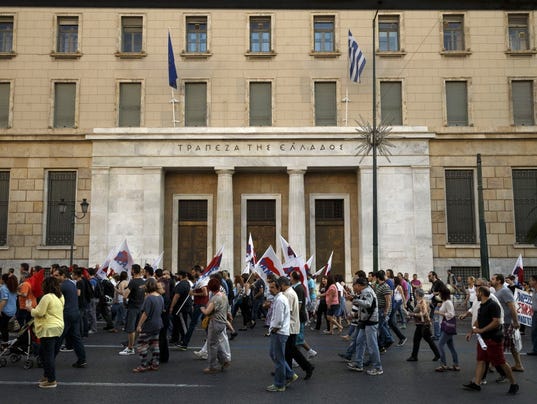
A hoped-for debt deal for Greece appeared to stumble Wednesday as Greek Prime Minister Alexis Tsipras suggested that international creditors did not accept the latest round of reform proposals from Athens.
Global markets, which have been gaining all week on expectations that a last-minute deal is likely, fell on the news.
In two posts on Twitter on Wednesday, Tsipras wrote: "The repeated rejection of equivalent measures by certain institutions never occurred before-neither in Ireland nor Portugal.
"This odd stance seems to indicate that either there is no interest in an agreement or that special interests are being backed."
It was not immediately clear what caused the fallout after it earlier emerged that Greece and its international creditors have just a few remaining items to agree on before a deal can be done to break months of deadlocked debt-crisis negotiations, according to the nation's economy minister.
"There are two or three very specific issues, and as you appreciate it's the last part, three out of the fifty measures that have been agreed," George Stathakis told Greece's Mega TV.
He did not elaborate on what those issues were, but they are thought to involve changes to Greece's tax system and pension reform.
Stathakis expressed confidence, according to Reuters reporters who watched the broadcast, that an agreement on the latest proposals from Athens would be accepted — before a June 30 deadline — by Greece's governing leftist Syriza party as well as the nation's creditors: the International Monetary Fund , European Central Bank and European Commission.
"I think this balanced deal is defensible to Syriza, and in Greek society too," Stathakis said.
As Greece has attempted to restructure its economy to meet the demands of its creditors following the 2008 financial crisis, its GDP has shrunk 25% compared to pre-crisis levels and unemployment has fallen by a similar amount.
Greek Prime Minister Alexis Tspiras is in Brussels on Wednesday to meet with eurozone finance ministers to try to resolve any lingering differences ahead of a summit of European leaders there on Thursday, when a deal could be formally approved.
Without a deal, there are fears the southern European country could default on $1.8 billion loan repayment to the IMF that is due at the end of the month as part of a $270 billion financial assistance package Greece received during the financial crisis.
In order to stave off bankruptcy, Athens needs to ink a deal with its creditors so that it can secure the remaining $8 billion, frozen since February, that it is due in aid.
Analysts says Greece's membership of the 19-nation euro-currency bloc is at stake.

No comments:
Post a Comment